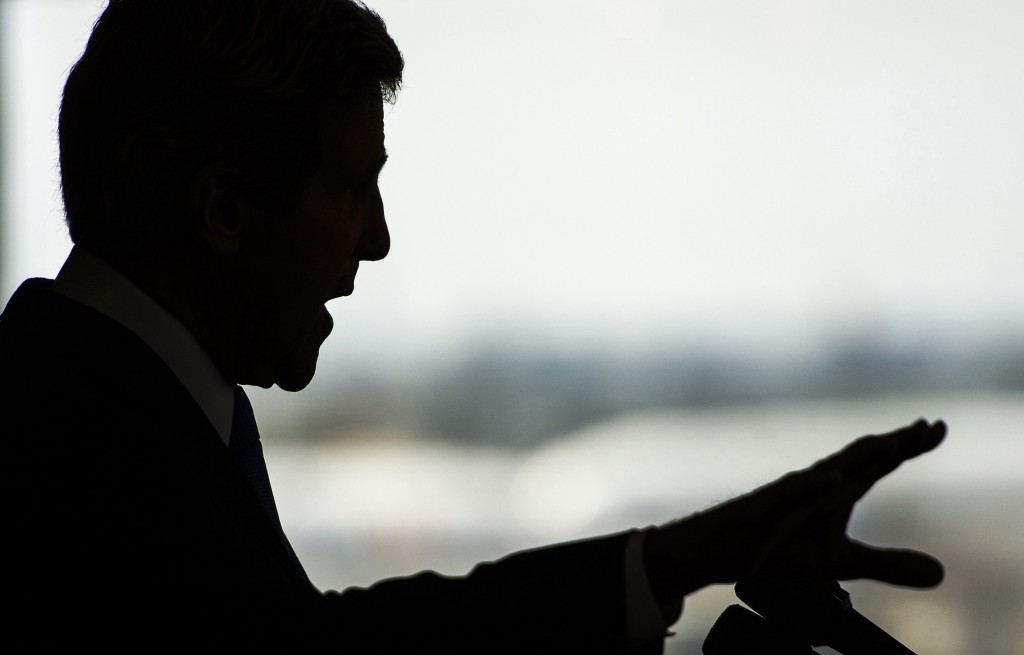Kerry Seeks Revival of Saudi Peace Plan

Secretary of State John Kerry is working to corral Israeli and Palestinian leaders into a new and ambitious peace process that includes reviving parts of a long-dormant Saudi plan embraced by the Arab world a decade ago, officials said.
The 2002 initiative that Kerry wants to revive parts of would provide Israel recognition throughout the Arab world in exchange for a pullout from territory conquered in 1967.
Kerry says he held “very constructive talks” with Israeli and Palestinian leaders during three days of high-level Mideast diplomacy. He says everyone is committed to continuing a process that could “create the conditions for peace” so direct Israeli-Palestinian talks can resume.
While he acknowledged that creating those conditions will not be easy, he expressed optimism for the long term. “Both sides mistrust each other deeply and there are reasons that mistrust has built up,” he added. “I am convinced that we can break that down.”
“I am intensely focused on this issue and the region because it is vital really to American interests and regional interests to try and advance the peace process and because this festering absence of peace is used by groups everywhere to recruit and encourage extremism,” Kerry told reporters.

Although Israel never accepted the plan and the Palestinians oppose any changes to it, the basic parameters seem to be gaining traction as a framework for future talks between the Israelis and Palestinians. Arab League chief Nabil El-Araby and Qatar’s prime minister will lead a delegation to Washington this month to discuss the initiative with Kerry, Arab officials said.
Kerry, however, is seeking new conditions to sweeten the deal for Israel, officials said. Arab and Palestinian officials say he has talked about upgraded guarantees for Israel’s security and allowances for border adjustments based on mutual agreement.
A senior State Department official would only say Kerry wanted the plan “enhanced.” The American official spoke on condition of anonymity because of Kerry’s orders not to brief reporters.
Among the countless peace plans and confidence-building strategies devised over the years, the Arab League’s initiative was one of the quickest to be dismissed. Israel has consistently rejected a return to the 1967 lines, which would mean abandoning Yerushalayim, Yehudah and Shomron and the Golan Heights.
The Palestinians are taking an inflexible stance on the issue. The chief Palestinian negotiator, Saeb Erekat, said Kerry has been floating the Arab initiative as a possible way out of the deadlock but that it could not be changed. “Kerry asked us to change a few words in the Arab Peace Initiative but we refused,” he told the Voice of Palestine radio station on Sunday.
Abbas left Monday for talks on the plan at an Arab League meeting in Qatar. There, a special committee was holding an “urgent meeting” on the subject, said Mohammed Subeih, the Arab League’s undersecretary for Palestinian affairs. Qatar’s prime minister chaired it and the foreign ministers of Egypt, Saudi Arabia, Jordan and the Palestinians participated.
On Tuesday, Kerry said he had agreed to work with Israeli and Palestinian leaders to boost economic growth in the Palestinian Authority and that he would provide full details of the economic plans next week.
“We agreed among us … that we are going to engage in new efforts, very specific efforts, to promote economic development … and to remove some of the bottlenecks and barriers that exist with respect to commerce in Yehudah and Shomron,” he said.
Regarding Iran, the Secretary of State said on Tuesday morning as he met with Israeli Prime Minister Binyamin Netanyahu that Iran will not be able to drag out negotiations over its nuclear program indefinitely.
“The United States of America has made clear that we stand not just with Israel, but with the entire international community in making it clear that we are serious, we are open to negotiation, but it is not an open-ended, endless negotiation,” Kerry said in joint remarks that accompanied the meeting. “It cannot be used as an excuse for other efforts to try to break out with respect to a nuclear weapon.”
“Iran cannot have and will not have a nuclear weapon,” Kerry stated flatly.
The meeting capped a three-day visit to the Mideast, which promises to be only the first of many for Kerry.
This article appeared in print on page D21 of edition of Hamodia.
To Read The Full Story
Are you already a subscriber?
Click "Sign In" to log in!

Become a Web Subscriber
Click “Subscribe” below to begin the process of becoming a new subscriber.

Become a Print + Web Subscriber
Click “Subscribe” below to begin the process of becoming a new subscriber.

Renew Print + Web Subscription
Click “Renew Subscription” below to begin the process of renewing your subscription.











